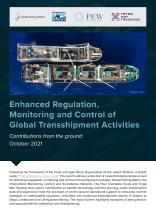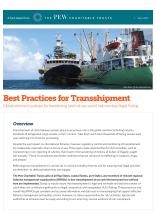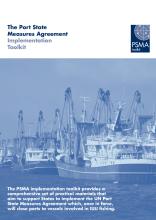Enhanced Regulation, Monitoring and Control of Global Transshipment Activities
Following the FAO's in-depth study "Transshipment: A closer look," this report captures contributions from the ground that aim to provide voluntary guidelines for the regulation, monitoring, and control of transshipment that are in fact robust, future-proof, and operationally achievable. The study recommends looking at seven key areas that would enable relevant authorities to minimize the risk of IUU-caught seafood entering the market and to ensure compliance with national and regional legal frameworks.
Language


